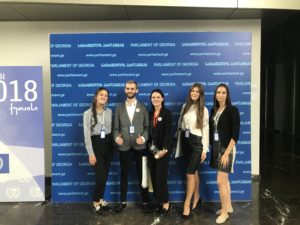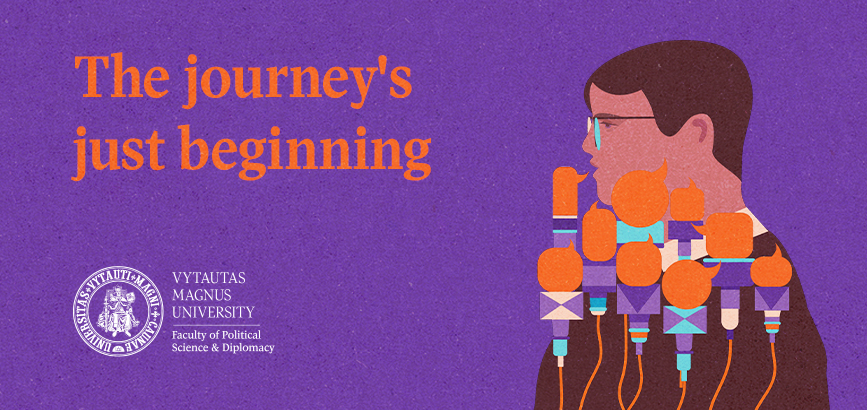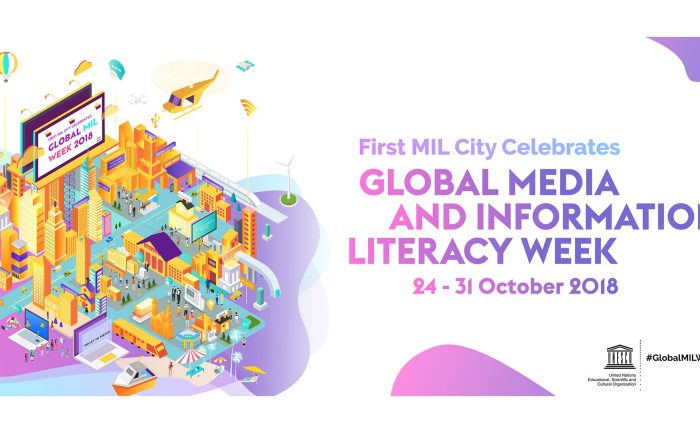Intensive course on Security Challenges in the Post-Soviet Area
Assoc. Prof. Gražvydas Jasutis, visiting research fellow in Geneva Academy of IHL and Human Rights, will give an intensive course on Security Challenges in the Post-Soviet Area in 2018/2019 Spring semester from 27of February till 8th of March for master students of the Faculty of Political Science and Diplomacy.
Assoc. Prof. Gražvydas Jasutis is a conflict management practitioner and held various positions in the EU Monitoring Mission in Georgia, the EU Monitoring Mission in Aceh (Indonesia), the OSCE Mission in Kosovo, the OSCE Mission in FYROM, the Permanent Delegation to NATO, and the Ministry of National Defence of Lithuania.
The course is a cross-disciplinary field of study that invites participants to learn big about the security and military issues in the post-soviet countries. It offers unique and practice-based approach to provide a disciplined and methodological review of conflicts, insurgency, military reforms, defence cooperation and regional military build-up. The course fundamentally applies a methodology of security (occasionally military) and conflict analysis.
The Department of Political Science invites students to enrol in this intensive course „POD5008 Spec. Course: Explaining Security Challenges in the Post-Soviet Area” at the student self-service portal https://studentas.vdu.lt/index.php?lang=EN when the registration for 2018/2019 Spring semester will be open.
Public lecture by H.E. Ambassador of Romania, Mr. Dan Adrian Balanescu
Celebrating 100 years anniversary since the Great Unification of Romania, Department of Political Science of Vytautas Magnus University has pleasure to invite for public lecture Dan Adrian Balanescu, Ambassador of Romania to the Republic of Lithuania and the Republic of Latvia. The topic of the lecture „The Great Union – Romania’s Greatest Achievement”.
Public lecture will held in English on 5-th of November, 2018 at 1pm, in room 311, Putvinskio 23.

Public lecture “Russia as a risk: how it acts and what we can do about it ?”

Public Lecture by the Professors of the Canadian University of Moncton
October 24, 2018 at Vytautas Magnus University will attend the Canadian University of Moncton, who will discuss not only university co-operation issues, but also read public lectures (V. Putvinskio St. 23-312, 11:00 a.m.) for Vytautas Magnus University students: Canadian socio-economic policy and its peculiarities North American context; Canada-US-Mexico (USMCA) New Commerce Agreement (English) and Canadian Integration Policy (French with translation into Lithuanian).
 Pierre-Marcel Desjardins
Pierre-Marcel Desjardins
Pierre-Marcel Desjardins has been teaching economics at the Université de Moncton since 1990 and is the Director of l’École des hautes études publiques. He has a Ph.D. in economics from the University of Texas (Austin). His current research projects focus on regional and rural economic development, public policy, and trade. He as been called upon by the governments of Canada and New Brunswick, as well as the United Nations and the Organisation for Economic Cooperation and Development (OECD) as an economic development specialist.
Christophe Traisnel
 A graduate of the Universities of Lille II, Paris II and Montreal, Christophe Traisnel is an Associate Professor of Political Science and Deputy Director of the École des Hautes Études Public (HÉP) at the Université de Moncton. Associate Researcher at the Canadian Institute for Research on Linguistic Minorities (CIRLM) and associate member of the Center for Studies and Research in Administrative and Political Sciences (CERSA, Paris II), he devotes his work to the international Francophonie, to migrations Canada, the Boreal Francophonie and linguistic minorities in Canada and Europe. In line with his dissertation on nationalism of protest in Canada and Belgium, he has also published numerous articles on political commitment, nationalism, French-speaking immigration and the recognition of minorities, particularly in the journals Lien social et Politics, Politics and Societies, Francophonies of America, Words, Hermes, Sociographic Research, Canadian Studies. He is also the author of The French in Sharing (Timée éditions), and Francophonie, Francophonismes: group of aspiration and forms of engagement (editions LGDJ – Panthéon-Assas).
A graduate of the Universities of Lille II, Paris II and Montreal, Christophe Traisnel is an Associate Professor of Political Science and Deputy Director of the École des Hautes Études Public (HÉP) at the Université de Moncton. Associate Researcher at the Canadian Institute for Research on Linguistic Minorities (CIRLM) and associate member of the Center for Studies and Research in Administrative and Political Sciences (CERSA, Paris II), he devotes his work to the international Francophonie, to migrations Canada, the Boreal Francophonie and linguistic minorities in Canada and Europe. In line with his dissertation on nationalism of protest in Canada and Belgium, he has also published numerous articles on political commitment, nationalism, French-speaking immigration and the recognition of minorities, particularly in the journals Lien social et Politics, Politics and Societies, Francophonies of America, Words, Hermes, Sociographic Research, Canadian Studies. He is also the author of The French in Sharing (Timée éditions), and Francophonie, Francophonismes: group of aspiration and forms of engagement (editions LGDJ – Panthéon-Assas).
VMU to Host Annual UNESCO Media and Information Literacy Conference
For the first time in Lithuania, the Baltic States, and the Northern Europe, the Feature Conference of Global Media and Information Literacy Week will be held at Vytautas Magnus University (VMU) on 24-25 October. The event, the 8th Media and Information Literacy and Intercultural Dialogue (MILID) Conference, will welcome about 300 participants from all over the world, including leading experts from the USA, France, Great Britain, and other countries.
Conference speakers will discuss the changing media environment, the influence of the media on social and political processes, and the competences and skills necessary for sustainable social, cultural, economic and political development of the world. The aim of the event is to promote international cooperation in the development of media and information literacy (MIL), support the role of academic institutions and their relations with other organizations, establish new partnerships, and stimulate discussions on these issues in the public sphere for the advancement of a smart, creative, and sustainable civil society.
“Over the last 40 years, which have been very dynamic in the context of the media, communications, and social change, UNESCO was one of the first international organizations to take on leadership in the development and promotion of international dialogue on MIL issues. From the Grunwald Declaration of 1982 to the Riga Recommendations of 2016, UNESCO has been inviting countries, organizations, creative industries, educational, scientific and cultural institutions to unite and cooperate in MIL networks and implement projects and initiatives”, one of the conference organizers, head of VMU Dept. of Public Communication, Prof. Kristina Juraitė, explained.
The conference is organized by UNESCO, Vytautas Magnus University, University of Latvia, and the national commissions for UNESCO in Latvia and Lithuania. Both VMU and University of Latvia are members of the UNESCO Media and Information Literacy and Intercultural Dialogue (MILID) Network. The guest speakers at the event will include Prof. Henry Jenkins from University of Southern California (USA), Prof. Sonia Livingstone from London School of Economics and Political Science (UK), Dr. Carl Heath (Sweden), Prof. Paul Mihailidis (USA) etc.
The theme of the conference, and of the entire Global MIL Week 2018, is Media and Information Literate Cities: Voices, Powers, and Change Makers. Discussions and paper presentations will focus on education of media and information literacy in the Baltic states, MIL as mediator between cultural industries and the city, the transformation of information needs in the cities, privacy and bullying online, the impact of digital environments in the age of misinformation, the role of MIL in the struggle for gender equality and women’s empowerment, the fight against hate and intolerance etc.
“The academic community has been given the rather important role at the forefront of the media and information literacy movement, which promotes the need for MIL in a sustainable, civil and democratic society. For this reason, this annual conference is primarily an opportunity for Lithuanian scientists to join international media literacy networks, get acquainted with the latest scientific studies and develop relevant research in the future”, Prof. Juraitė said.
Three years ago, the professor and other VMU scientists conducted a study on media literacy in Lithuania. The study, titled “Education of News Literacy: How to Understand Media?”, involved two public surveys where questions were answered by 15-17 year old pupils and adults (from 18 years old) respectively. The results demonstrated that the more educated individuals tend to assess online content more critically and verify the veracity of the news. The experts also prepared guidelines for the Lithuanian media policy: they proposed to review the methods of promoting and sponsoring journalism, with more focus on public interest, and to reassess the teaching of media literacy at schools.
This year VMU has strengthened its relations with the United Nations Educational, Scientific and Cultural Organization: the university has opened the UNESCO Dept. of Media and Information Literacy, which conducts MIL research: analyses media consumption, media policy, citizen participation and empowerment trends, and MIL education initiatives. The department also aims to develop MIL competences of students and educators and disseminate information on these issues in Lithuania and internationally.
“This acknowledgement is a result of long cooperation with UNESCO and other international organizations in the field of MIL research and studies. In their development of media research, VMU scientists have been actively involved in UNESCO-initiated MILID and GAPMIL networks and the activities of international scientific associations ECREA, ICA, BAMR, and AABS”, the head of VMU Dept. of Public Communication explained.
According to Prof. Juraitė, the UNESCO conference should be of particular interest to scholars of a wide variety of fields, including communication, journalism, education science, sociology, politics, public administration, arts, creative industries and other areas, as well as education and media policymakers, NGOs, businesses and start-ups.
The 8th annual UNESCO Media and Information Literacy and Intercultural Dialogue (MILID) Conference will be held on 24-25 October in Kaunas, at Vytautas Magnus University (S. Daukanto g. 28). On 26 October, the participants will attend further events in Riga organized by the University of Latvia.
Ambassador-at-large for Hybrid threats will give a public lecture
Eitvydas Bajarūnas, Ambassador-at-large for Hybrid threats will give a public lecture “Hybrid warfare in the EU: influences and response strategies”. Lecture discussion will take place at VMU Faculty of political science and diplomacy, room 311 (Putvinskio str. 23, Kaunas) on October 5, start at 16.30h. We invite you to join and participate!

The Riga Conference 2018 commences with questions on our future
28th -29th of September, the largest security and foreign policy forums in the Baltic Sea region – The Rīga Conference 2018 – commences at the National Library of Latvia. Over the two days the conference welcomed heads of states, experts, diplomats, academics and media representatives together with some 700 experts from around the world discussing touching questions to the Western alliances.
The conference was opened by President of the Republic of Latvia H.E Mr Raimonds Vējonis. The former President of the Republic of Latvia, Prof. Dr. Vaira Vīķe Freiberga, together with the former Minister of National Defence of Poland, Mr Antoni Macierewicz, and Director of the International Centre for Defence and Security, Mr Sven Sakkov will look back over the last century, seeing what lessons we can learn and whether sovereignty of states in Europe can be secured in a hostile environment.
The second panel whether we can count on NATO for the century ahead. The ministers of Defence of Latvia and Lithuania, Mr Raimonds Bergmanis and Mr. Raimundas Karoblis, respectively, will join Lt.Gen (Ret.) Frederick Benjamin Hodges, of CEPA and Prof. Dr Julian Lindley-French to assess whether NATO can remain an important player in defence of peace in the region.
The first day of the conference was concluded by understanding the mid-term economic outlook for the European Union. The Vice-President for the Euro and Social Dialogue, Mr Valdis Dombrovskis, together with Ms Dana Reizniece-Ozola, the Minister of Finance of the Republic of Latvia, Mr Christian Whiton, Senior Vice President at Banner Public Affairs, and Prof Dr Michael Eilfort of Market Economy Foundation provided their opinions.
The conference discussions will be streamed live on the DELFI portal/ our informative partner portals and The Rīga Conference 2018 website www.rigaconference.lv. As always, the online audience is encouraged to participate in discussions via Twitter, using #RigaConf18. The language of the conference is English.
Arūnas Molis professor of Political Science and Diplomacy and lecturer Donatas Vainalavičius participated in a conference.
Public Lecture Committee of Permanent Representatives in the European Union: how it works
Department of Political Science of Vytautas Magnus University has a pleasure to invite for public lecture titled Committee of Permanent Representatives in the European Union: how it works?, which will take place on 1st of October, at 1 pm, in room 311 (Putvinskio st. 23, Kaunas).
The topic will be presented by Darius Šimaitis, head of COREPER II Division in European Union Department in Ministry of Foreign Affairs of the Republic of Lithuania.
Before becoming head of COREPER II Division Darius Šimaitis has worked as a Legal Counsellor in the Permanent Representation of Lithuania to the European Union.
VMU student G.Čepulytė awarded by Sakartvelo institutions for UN model simulation

On the 12-16th of September, 2018, in Kutaisi city, Sakartvelo it was organized the international UN model simulation. Model UN simulations are usually meant to expand the views of the students, to help them better understand the daily work of the United Nations and attain practical skills in negotiations and decision-making. These events are mostly organized and run by students.
The faculty of Political science and diplomacy of Vytautas Magnus University was represented by Gertrūda Čepulytė, Artūras Matusevičius, Evelina Batakytė, Sandra Kudzmaitė, Vaineta Kazlauskaitė and Ieva Jakubavičiūtė.
This event, UN model simulation in Kutaisi, attracted students from 11 different countries, who took the tasks and participated in the simulation while representing different assigned countries- UN member states. The best participants of the Model UN were rewarded in different categories: Best public speaker, Best Delegation, Best position paper.
Gertrūda Čepulytė received an award ( first place) for the public speech in the category “best public speaker” while representing the position of the Republic of Yemen. Gertrūda was also awarded with gifts from the Kutaisi City Hall, Peace Corps, and LDA Georgia organisations.
Congratulations!
Rethinking Regional Studies: the Baltic-Black Sea Connection
Name of the project: Rethinking Regional Studies: the Baltic-Black Sea Connection (BBSR)
Duration: 15 October 2017 – 14 October 2021
The project’s goal was to modernise regional studies at the Ukrainian partner universities, internationalise their study offer and provide support in implementing international projects.
The project achieved its main goals, which were:
– creation of an English-language MA programme (the first corresponding to Bologna principles) on Baltic and Black Sea Region Studies at Ivan Franko National University of Lviv thereby modernising regional studies in Ukraine; overall 22 new courses were developed in the four Ukrainian universities;
– creation of modules on regional studies at other Ukrainian universities, embedded in the international relations studies;
– new knowledge and skills in regional studies and international relations;
– facilitating innovative ways as well as the quality of teaching and learning at Ukrainian universities by the purchase of equipment, including smartboards, anti-plagiarism software, access to online resources, and thematic books;
– in addition to equipment, an adequate training was provided for both teachers and students on academic writing and integrity, plagiarism, innovative teaching methods, blended courses etc.
Among other achievements:
– the students of Ukrainian universities have received international learning experience both at a winter school in Estonia as well as in Mariupol;
– the project has intensified other cooperation between the Ukrainian partners themselves and with the EU partners;
– thanks to the project, decrees have been adopted at IFNUL about the international cooperation and projects; project results have been disseminated on the project webpage and Facebook page, at different conferences and meetings, as well as regional newspapers and TV. The project has contributed to the internationalisation of curricula at partner universities, more effective use of online learning methods, raised awareness of both teachers and students on plagiarism.
Partners:
University of Tartu, Estonia
Ivan Franko National University of Lviv, Ukraine
Adam Mickiewicz University in Poznań, Poland
Lund University, Sweden
Vytautas Magnus University, Kaunas, Lithuania
Mariupol State University, Ukraine
Odessa National I. I. Mechnikov University, Ukraine
Taras Shevchenko National University of Kyiv, Ukraine
***



















